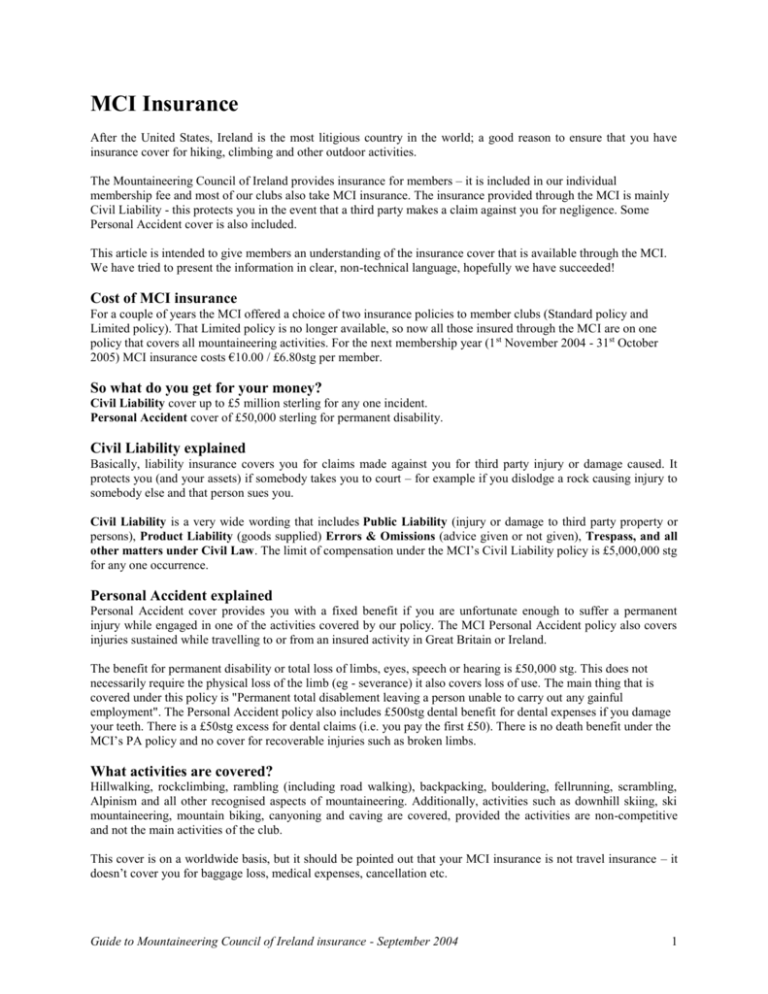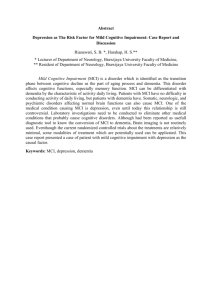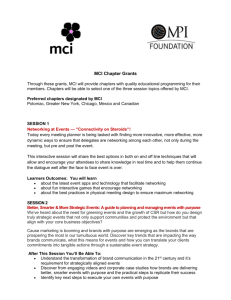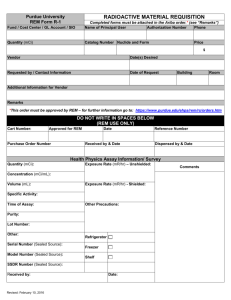MCI Insurance
advertisement

MCI Insurance After the United States, Ireland is the most litigious country in the world; a good reason to ensure that you have insurance cover for hiking, climbing and other outdoor activities. The Mountaineering Council of Ireland provides insurance for members – it is included in our individual membership fee and most of our clubs also take MCI insurance. The insurance provided through the MCI is mainly Civil Liability - this protects you in the event that a third party makes a claim against you for negligence. Some Personal Accident cover is also included. This article is intended to give members an understanding of the insurance cover that is available through the MCI. We have tried to present the information in clear, non-technical language, hopefully we have succeeded! Cost of MCI insurance For a couple of years the MCI offered a choice of two insurance policies to member clubs (Standard policy and Limited policy). That Limited policy is no longer available, so now all those insured through the MCI are on one policy that covers all mountaineering activities. For the next membership year (1 st November 2004 - 31st October 2005) MCI insurance costs €10.00 / £6.80stg per member. So what do you get for your money? Civil Liability cover up to £5 million sterling for any one incident. Personal Accident cover of £50,000 sterling for permanent disability. Civil Liability explained Basically, liability insurance covers you for claims made against you for third party injury or damage caused. It protects you (and your assets) if somebody takes you to court – for example if you dislodge a rock causing injury to somebody else and that person sues you. Civil Liability is a very wide wording that includes Public Liability (injury or damage to third party property or persons), Product Liability (goods supplied) Errors & Omissions (advice given or not given), Trespass, and all other matters under Civil Law. The limit of compensation under the MCI’s Civil Liability policy is £5,000,000 stg for any one occurrence. Personal Accident explained Personal Accident cover provides you with a fixed benefit if you are unfortunate enough to suffer a permanent injury while engaged in one of the activities covered by our policy. The MCI Personal Accident policy also covers injuries sustained while travelling to or from an insured activity in Great Britain or Ireland. The benefit for permanent disability or total loss of limbs, eyes, speech or hearing is £50,000 stg. This does not necessarily require the physical loss of the limb (eg - severance) it also covers loss of use. The main thing that is covered under this policy is "Permanent total disablement leaving a person unable to carry out any gainful employment". The Personal Accident policy also includes £500stg dental benefit for dental expenses if you damage your teeth. There is a £50stg excess for dental claims (i.e. you pay the first £50). There is no death benefit under the MCI’s PA policy and no cover for recoverable injuries such as broken limbs. What activities are covered? Hillwalking, rockclimbing, rambling (including road walking), backpacking, bouldering, fellrunning, scrambling, Alpinism and all other recognised aspects of mountaineering. Additionally, activities such as downhill skiing, ski mountaineering, mountain biking, canyoning and caving are covered, provided the activities are non-competitive and not the main activities of the club. This cover is on a worldwide basis, but it should be pointed out that your MCI insurance is not travel insurance – it doesn’t cover you for baggage loss, medical expenses, cancellation etc. Guide to Mountaineering Council of Ireland insurance - September 2004 1 Exclusions Commercial activity, professional guiding and instruction. Persons under the age of three or over the age of 70 are excluded from Personal Accident cover. Personal Accident claims arising from sickness/illness (as opposed to accidental injury which is insured), HIV, drugs, etc. Exclusions under the Civil Liability cover include any accident involving a motor vehicle, injury to employees and the usual war and nuclear clauses (full details available from the MCI office). Reporting an incident All incidents involving injury or damage to an MCI member or a third party must be reported to our brokers (Perkins Slade) within 21 days. This is a requirement under the Civil Justice System in the UK (our insurers are UK based). Please copy your notification to the MCI office. If you, or your club, are involved in any incident that could lead to a court case, play safe and report it immediately. In the case of a possible liability claim, the incident must be notified to the insurers by the party likely to be sued (eg the club, leader etc.) rather than the injured party. With Personal Accident claims the injured party is the claimant and they should report the incident to the insurers. Negligence While it is advisable to report all incidents to the insurers, it is useful to know what an injured party would need to prove to succeed in suing you for negligence. There are three stages to this: 1. The injured party must prove that you owed them a duty of care. You owe a duty of care to any person who could foreseeably be affected by your actions, and the standard of that care can vary for a host of reasons, eg your experience and the experience of the others involved. If you are in charge of minors you owe a greater duty of care – that of a responsible parent. 2. The injured party must show that the duty of care was breached. 3. The injured party must prove that actual injury, loss or damage arose from that breach of the duty of care. Each case will be different, for example there could be contributory negligence - where the injured person is partly responsible for the injury (eg by not wearing their helmet). We should remember too that injuries in the mountains are not always the result of negligence - accidents do happen. Risk cannot be eliminated from mountaineering; it is there at some level in every aspect of our activity. Hillwalking and climbing activities are rooted in a spirit of selfreliance, and with current concerns about liability, safety, insurance etc it's easy to lose sight of that personal responsibility. Including the MCI participation statement in your membership form or club newsletter is a useful way of reinforcing this: "The MCI recognises that hillwalking, climbing and rambling are activities with a danger of personal injury or death. Participants in these activities should be aware of and accept these risks and be responsible for their own actions and involvement." Insurance for clubs Our insurance scheme is on a compulsory basis, therefore Clubs that opt for MCI insurance must pay a premium for each of their members, not just the committee, leaders etc. If we were just to insure those most likely to be sued, the premium would be much higher and we would be placing an unfair burden on voluntary leaders. Besides, any member could cause an accident, eg by leaving a gate open allowing animals to stray onto the road. If a club does not declare all its members to the MCI, the declared members are insured on an individual basis but the club itself has no insurance against liability, leaving the undeclared club members uninsured and personally vulnerable to a claim. As well as walking and climbing, other club activities such as fund-raising and social events are covered by your MCI insurance. Guide to Mountaineering Council of Ireland insurance - September 2004 2 New members are insured from the day they pay membership to the club, provided that the club clearly records the date of payment (eg by using a receipt book) and that the money and member’s details are passed on to the MCI within 4 weeks. MCI clubs that have their own insurance policies are advised to check the limit of indemnity on their liability cover awards of over £2 million have been made abroad, and others are pending. You should also check if you have Public Liability or the wider Civil Liability cover, in particular check if you have cover for member-to-member liability (this is one of the benefits of our Civil Liability policy). If re-considering your insurance options, bear in mind that if there is a claim against your policy, the MCI will be in a better position to support and advise you if you have taken MCI insurance. Any clubs that currently have no insurance are strongly advised to consider taking out insurance. Where school or university mountaineering clubs are operating under the parent body’s insurance they should check that they have adequate cover for their activities. Contact details If you have any queries on the MCI's insurance cover please write to Helen Lawless at the MCI office or e-mail mci@eircom.net. The MCI's insurance brokers are: Perkins Slade Ltd., 3 Broadway, Broad Street, Birmingham B15 1BQ. Phone: 00 44 121 6988000, fax: 00 44 121 6259000 Frequently asked questions A selection of the most common insurance enquiries received through the MCI office What is the insurance position if a non-member wants to come out with the club? For example, a friend of a member who is visiting town, or a potential member who is simply trying out the activity? Our insurers accept that all clubs will at times have a minority of non-insured people out with them. Any non-members participating in club activities are treated as third parties. Therefore, if they get injured as a result of negligence on the part of your club or its members, they can sue for damages and your club / members will be indemnified through the MCI’s Civil Liability policy. If they get injured through no fault or negligence of yours (eg if they trip over something) they have no grounds to sue you and they do not have MCI Personal Accident cover, as they have not paid membership fee / insurance. It’s a good idea to make it clear to non-members that they may participate in your activities, but to keep things simple say that they are not covered by insurance. Some clubs have a policy that new people can come out twice before they are required to join. Is a club member covered if s/he is engaged in mountaineering activities outside the club? Yes – you are covered for all mountaineering activities, whether or not you are with your club. This does of course exclude professional risk - for example if you were earning money as a professional leader or guide. One of our members slipped and broke her elbow while walking in Kerry. She needed an operation to have pins inserted and will be in plaster for 3 months. Is she entitled to anything under our MCI insurance cover? The MCI's Personal Accident policy only covers permanent disability (also £500stg dental cover), it does not provide payment for recoverable injuries such as this. However if the casualty can prove negligence on the part of another person(s) she could sue, and providing that party is insured, the MCI Civil Liability insurance would provide an indemnity if necessary. Please note that all incidents must be reported to the insurers within 21 days. I’m planning a walking and climbing trip to Corsica, does my MCI insurance cover this? Guide to Mountaineering Council of Ireland insurance - September 2004 3 Your MCI insurance applies worldwide, but the type of cover does not change. MCI insurance is not travel insurance – it doesn’t cover you for cancellation of your trip due to illness, loss of baggage or passport, medical expenses etc. A standard travel policy would provide much of this, but all aspects of that cover would be void if walking and climbing are not covered by the policy, Therefore it is recommended that you take out specialist travel and activity insurance that will give you cover for your activities, and also for search and rescue. There is no charge for mountain rescue services in Ireland and Great Britain, but in many other countries you will be charged, for example a helicopter rescue and hospital treatment in France could cost €30,000. MCI members are entitled to avail of the BMC’s travel and activity policies (you don’t need to become a BMC member). The BMC offer five levels of cover tailored to the needs of mountaineers. To get BMC insurance you should contact the BMC directly on 0044 870 010 4878 or do it through their website – www.thebmc.co.uk. Our club is organising a sponsored walk, many of the participants won't be club members, or MCI members, is this covered by our MCI insurance? Yes - all events organised by insured clubs, from training courses to your annual barbecue, are covered by your Civil Liability policy. Even though there is money involved here, the participants are not paying you to provide the walk, so it is covered. On a completely different note, the MCI is opposed to the use of the mountains for fundraising purposes, on safety and environmental grounds. I already have Personal Accident insurance, do I still have to pay for this with my MCI membership? Yes – it’s not optional, however the good news is that with Personal Accident cover you can have as many policies as you want and claim on them all. This is not the case with most other types of insurance. Have there been any claims on the MCI insurance? Apart from a couple of dental claims, there has been no successful claim from the MCI membership, this is one of the reasons we have been able to get such good terms for next year’s cover. Fingers crossed for another safe year ahead! ___________________________________________________________________ This article is intended to give assistance to clubs and members in understanding the insurance cover that is available through the MCI. We have deliberately tried to use clear, non-technical language. This article is not intended as a legal interpretation of the MCI’s insurance scheme and should not be used as such. For this purpose, reference should be made to the insurance policies themselves, which are available from the MCI Office. Thanks to Mary Nash, Perkins Slade Ltd and David Walsh for their assistance with this article. Helen Lawless Updated September 2004. Guide to Mountaineering Council of Ireland insurance - September 2004 4








